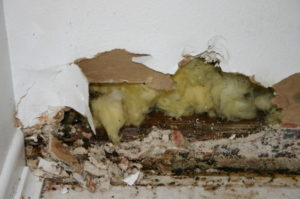Slab Leaks: What Are the Causes of Slab Leaks?
Despite the name of this plumbing malady, slab leaks are not leaks in your concrete slabs. Slab leaks are plumbing leaks that occur under a building’s concrete slab foundation.
These leaks can become evasive to detection and expensive plumbing problems.
Common Causes of Slab Leaks
Slab leaks develop because of corrosion, abrasion, pressure or poor craftsmanship. Corrosion occurs when elements inside and outside a pipe interact to cause a chemical reaction and wear a hole in the piping.
Abrasion takes place when piping expands and contracts causing a pipe to rub against an obstruction until it bursts. This is also typical of damaged joints and joints without coupling adhesion.
Pressure leaks happen because of natural events, such as earthquakes or tremors, or construction errors. They can cause pipes to crease or bend.
Over time, water will wear through the area of uneven contact. The last leak-causing culprit is poor craftsmanship. Poor installation can cause any combination of the above symptoms.
Identifying Signs of Slab Leaks
There are several signs of potential slab leaks. One warning sign is a huge jump in your monthly water bill. A large drop in water pressure is another sign of a leak. You can investigate this further by turning off running water in the structure including running toilets.
If the dial on your water meter is turning, it’s a strong sign of a leak. If the dial’s not turning, you may want to take the test one step further by checking for smaller leaks. Leave the water off and check your meter after an hour. The meter reading should not change. Another way to check for leaks while the water is off is to listen for the sound of running or dripping water.
Your plumbing should stay quiet with the taps and lines closed. Sewage leaks are much harder to detect. You normally will not know your sewage is leaking until your floor starts to “heave” or rise in the form of a bubble in the middle.
Water line and sewage leaks can cause puddles to develop around the exterior of the house. If any of the above symptoms are present in your home or business, your next course of action is to have a professional plumber inspect your plumbing for leaks.
A trained plumbing technician can inspect your property for slab leaks with electronic equipment without tearing apart your foundation. When the plumbing technician is checking your water line, ask them to check the sewage line as well.
Time Frame for Slab Leak Repair
 Slab leak repair is normally a two-day job. The first day consists of confirming and locating the potential leak that you discovered with preliminary testing. The second day consists of completing any necessary repairs.
Slab leak repair is normally a two-day job. The first day consists of confirming and locating the potential leak that you discovered with preliminary testing. The second day consists of completing any necessary repairs.
Slab leaks are usually a result of natural forces or poor craftsmanship. Preliminary tests can find potential leaks in your system.
If your system does not pass preliminary manual testing, it’s necessary to call on the services of a plumbing professional to confirm or refute your suspicions. If the plumbing technician finds a leak, they can complete the repairs in as little as two days.
Are you seeing signs of a slab leak in your West Covina home? No time to waste here, Call Drainiacs Plumbing, Drain & Sewer at (626) 962-0885 to see what is causing that slab leak.
